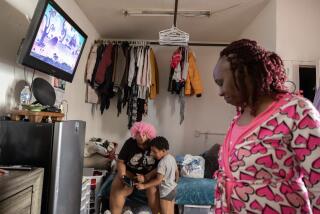Years Down the Drain : Couple Paid City Sewer Fees Since 1942 . . . Then Found Out They Were on Septic
- Share via
Marian Vinyard made the discovery just over a week ago while washing three loads of clothing in the back of her Vine Street home in Mission Hills. Water was seeping through cracks in the concrete walkway in her back yard.
“It was smelly,” the 81-year-old woman said.
Two days later, plumbers unearthed her strawberry patch and uprooted the cause of the problem: an old septic tank that had rotted away over the years.
“Well, I was flabbergasted,” Marian said. “I just couldn’t believe it. You learn something new every day. Don’t you?”
Assumption Was Wrong
Fred and Marian Vinyard sort of assumed that they were hooked into the city’s sewer system ever since they purchased the Spanish-style home in 1942, and they have been dutifully paying their sewage bills every other month. Now, the couple says, the San Diego Building Inspection, Water and Sewer Permit Department wants $3,200 to connect their home to the city’s sewer system. On top of that, there is an additional $1,000 to get a plumber to run a sewer line beneath the house to the city sewer line.
But the elderly couple maintains that “it’s just not fair” that after paying their sewer fees over the years, assuming the sewage they generated was being treated by the city, they should have to pay to be connected to a service they thought they had all along.
“How would we know where to go to see if we had a septic tank or why would we think that we had a septic tank?” Marian asked incredulously.
Barbara Thompson, the head customer service representative for the city’s Water Utilities Department, says the couple should have been told that the house was hooked to a septic tank when they bought it.
“She had no idea that she was hooked to a septic tank and we had no idea that she was not hooked up to our sewer lines,” she said.
Under a 1956 provision of the San Diego Municipal Code, Thompson said, all homes that are within 150 feet of city sewer lines are charged for the maintenance and operation of the city’s sewer system along with regular water usage fees. The actual cost for treatment of sewage generated from a home “is only a very small portion” of the sewer fee on the bill, she said.
Thompson said the provision exists to encourage people who live near city sewer lines to use them. She said the first sewer connection in the neighborhood where the Vinyards live was made in 1929, so there was access when they moved in 46 years ago.
“I have never known of anything like this before,” said Thompson, who has been with the department 22 years.
Thompson, who only had access to payment records for the Vinyards dating back two years, said the couple has paid $209.54 in sewer fees since April of 1986.
Marian Vinyard cannot estimate how much she has paid in sewer fees over the years.
With no septic tank and no hook-up to city sewer lines, life has been a little inconvenient for the retired founders of the Vinyard Overhead Garage Doors business on Pacific Highway. For Marian, it means no gardening and that she can’t use her washing machine until they get a sewer hook-up.
“Now, we can’t even take baths one after the other,” she said. “One of us takes one and the other goes the next hour. We have to be very careful about how much water we put into that empty hole down there.”
But the Vinyards say the ordeal has been more of a financial inconvenience than anything, especially since they receive roughly $570 a month in Social Security payments.
“We have been living off our Social Security, and we have a little interest on a CD account we use for living expenses,” Marian said. “That doesn’t take us very far.”
“When you get over 80, your doctor bills come pretty fast,” said Fred, who is 84.
Marian says she will pay for the connection with money from her CD account if she has to and “get the whole thing over with.”
“We can’t live without a sewer connection,” she said. “We’ll just have to be careful what we spend our money on.”
Fred still thinks it’s not fair.
“If this would have happened back when I had some income, then we could take care of things like this, “ he said. “But what about all that money that we paid in sewer fees over the years?”
More to Read
Sign up for Essential California
The most important California stories and recommendations in your inbox every morning.
You may occasionally receive promotional content from the Los Angeles Times.










